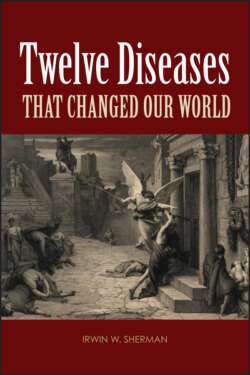Читать книгу Twelve Diseases that Changed Our World - Irwin W. Sherman - Страница 13
The influence of hemophilia during World War II
ОглавлениеLeopold, the eighth child of Queen Victoria, was born on 7 April 1853. He was the only son to be affected by hemophilia. He bruised easily and suffered many bouts of internal bleeding. He became a chronic invalid with an abnormal posture. Victoria considered him unattractive, saying, “He is tall, but holds himself worse than ever, and is a very common looking child, very pale in face, clever but an oddity—and not engaging though amusing.” The Queen was so ashamed of Leopold that he was frequently left behind while the rest of the family went on holiday. Leopold used these times to read widely, and he was one of the most intelligent of Queen Victoria's children. The Queen recognized his intellectual capacities, and when he was 24 she made him one of her private secretaries with access to state papers, a privilege denied to his brother Edward Prince of Wales. In 1881, Queen Victoria made Leopold the Duke of Albany, and the following year he married Princess Helena of Waldeck, sister of the Dutch queen. The Duke and Duchess of Albany had a daughter, Princess Alice (a carrier of hemophilia), and a son, Charles Edward Leopold, who was born shortly after his father's death at the age of 31 from a cerebral hemorrhage after falling down a flight of stairs. Charles Edward Leopold could not inherit hemophilia from his father (see p. 9–10), but at the age of 16 he did inherit the dukedom of Saxe-Coburg and Gotha from his uncle Alfred, Duke of Edinburgh, and he rose to the rank of general in the German Imperial Army. With the collapse of Germany after World War I, he had to abdicate his dukedom; however, he was a prominent member of the Deutsches Nazionalist Volks Partie (DNVP) and helped forge an alliance between it and the Nazional Sozialist (Nazi) Partie. In 1933, when Adolf Hitler was elected chancellor, the DNVP disbanded and many of its members joined the Nazis. Charles Edward Leopold became a group leader in the Nazi Brownshirts. In 1936 Hitler sent him to Britain in his capacity as President of the Anglo-German Fellowship; his real mission was to assess the possibility of an alliance between the two countries. During his stay he met with his cousin Edward VIII and several high-level politicians. After his first meeting with Edward VIII in early 1936, Charles Edward Leopold reported to Hitler that the new King would be amenable to such an alliance and would exercise his influence to make this a “guiding principle of British foreign policy.” The Duke went so far as to report that Edward dismissed the need to discuss this with the Prime Minister, Stanley Baldwin. However, the Duke was not a reliable reporter, and his assertion was never confirmed by Leopold von Hoesch, the German ambassador to Britain.
In December 1936, Edward VIII abdicated (becoming thereafter the Duke of Windsor) to marry Wallis Simpson, an American divorcée. The following year, the Duke and Duchess of Windsor visited Germany, where the Duke met with Hitler, Goering, and Goebbels and greeted Hitler with a Nazi salute; his cousin Charles Edward Leopold celebrated the visit with a gala dinner in his honor. The cordial relationship between Hitler and the Duke of Windsor caused great consternation to the new King, George VI, and his government in the years before the outbreak of World War II. Early in the war, Germany unleashed a destructive air offensive against Great Britain. This was perceived by the Prime Minister, Winston Churchill, as a prelude to an invasion of Britain. The Duke of Windsor was reported to have recommended ending the war “before thousands more were killed or maimed to save a few politicians.” It was even rumored that Hitler was so intent on maintaining the Duke within reach of Germany that he contemplated either kidnapping or bribing him. In order to remove Edward from any German influence and to avoid having him in Britain, Churchill arranged for him to be appointed Governor of the Bahamas. In late July 1940, Hitler, through intermediaries, audaciously suggested that the Duke might return to the British throne if Germany was victorious; there is no evidence that the Duke responded to this proposal. The Duke hesitated before accepting the Governorship of the Bahamas, partly because of German-inspired rumors that the British Secret Service was planning to assassinate him once he arrived there. He eventually accepted the post and sailed for Nassau in August 1940.
Meanwhile, Charles Edward Leopold provided encouraging, if greatly exaggerated, reports to Hitler on the pro-German party's strength in Britain, reinforcing Hitler's hope that Britain might still be persuaded to form an alliance with Germany. It has been suggested that Hitler delayed his attack on Britain in 1940 as a result. For his pro-Hitler role, Charles Edward Leopold paid a heavy price: two of his sons died in the war, and he lost most of his estates, which were in the Russian zone of Germany. After the war, the Duke and Duchess of Windsor lived in exile in France for the rest of their lives.
